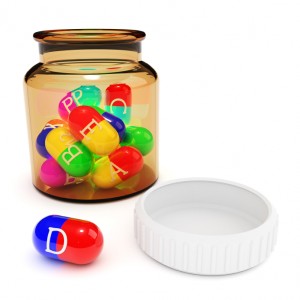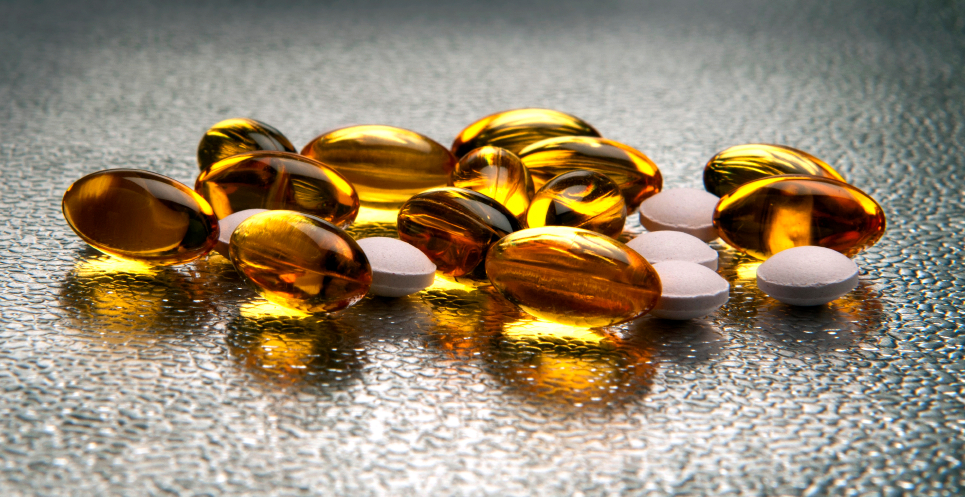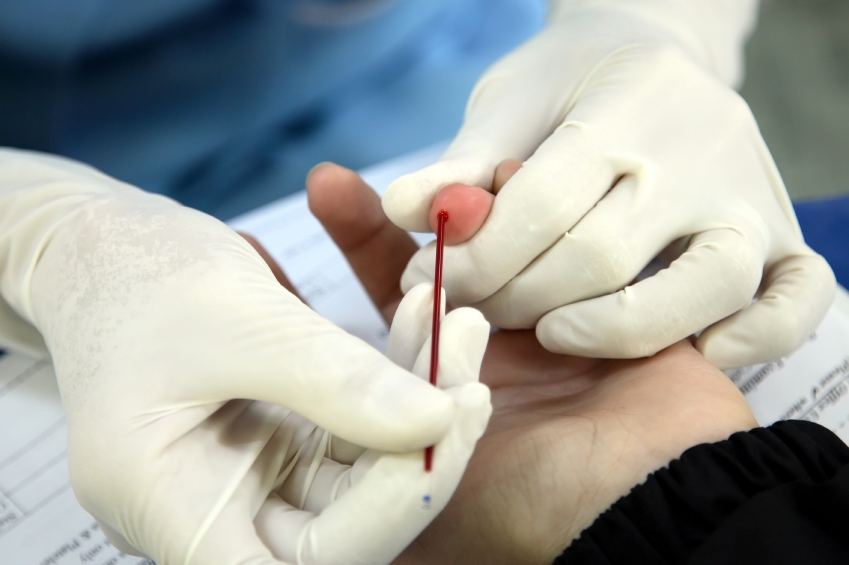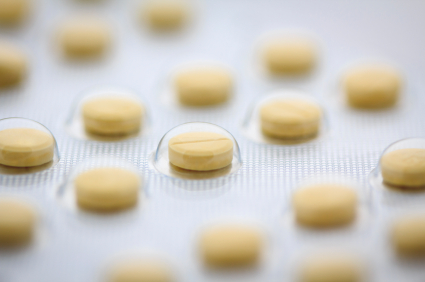Thiamine (Vitamin B1) May Increase Effectiveness of Antidepressants
A new study suggests that the nutritional supplement vitamin B1, also known as thiamine, can improve symptoms of depression when taken with an antidepressant. Edith Holsboer-Trachsler and colleagues presented the research from their randomized, double-blind, placebo-controlled study at a recent scientific meeting. In a 12-week study, about 50 adults (averaging 35 years of age) with major depression were prescribed a selective-serotonin reuptake inhibitor (SSRI) antidepressant. In addition, half received thiamine supplements while the other half were given placebos. Starting at six weeks, those receiving thiamine with their antidepressant showed more improvement in their depressive symptoms than those receiving the antidepressant alone.
Thiamine is an essential nutrient for humans. It is found in foods such as yeast, pork, cereal grains, and certain vegetables. Thiamine deficiency has been linked to irritability and symptoms of depression, while thiamine supplementation can improve mood and reduce feelings of stress. No side effects were reported in the study.
Holsboer-Trachsler and colleagues hope that thiamine supplementation may help patients adhere to their antidepressant regimens by decreasing the time it takes until their moods begin to lift.
Perinatal Choline Supplements May Reduce Risk of Schizophrenia
 Many psychiatric illnesses, including bipolar disorder, schizophrenia, autism, attention deficit hyperactivity disorder (ADHD), and anxiety disorders may stem from abnormalities in brain development that begin before birth. Researchers are trying to determine whether dietary supplements taken by pregnant mothers or infants can reduce the risk of such illnesses. At a recent scientific meeting, researcher Randal Ross and colleagues reported that compared to placebo, choline supplements reduced problems with a brain process called sensory gating in one-month-old infants and also improved the children’s attention span and social skills at age 3.
Many psychiatric illnesses, including bipolar disorder, schizophrenia, autism, attention deficit hyperactivity disorder (ADHD), and anxiety disorders may stem from abnormalities in brain development that begin before birth. Researchers are trying to determine whether dietary supplements taken by pregnant mothers or infants can reduce the risk of such illnesses. At a recent scientific meeting, researcher Randal Ross and colleagues reported that compared to placebo, choline supplements reduced problems with a brain process called sensory gating in one-month-old infants and also improved the children’s attention span and social skills at age 3.
Sensory gating is the process by which the brain filters out unimportant information, to avoid flooding higher cortical centers with irrelevant stimuli. Deficits in the way the brain inhibits response to this type of irrelevant information are associated with mental illnesses such as schizophrenia.
In Ross’s study, healthy pregnant mothers received either a placebo or 6300 mg of choline, a nutrient found in liver, egg yolks, and meat. After delivery, the infants also received 700 mg of supplemental choline per day. In children who carried CHRNA7, a risk gene for schizophrenia discovered by Ross’s colleague Robert Freedman, choline reversed the associated risk of sensory gating problems and normalized their behavior at age 3.
Saffron Is An Effective Treatment for Mild Depression
Saffron, the expensive yellow spice derived from the plant Crocus sativus, was the subject of a recent meta-analysis in the journal Human Psychopharmacology. The meta-analysis included six studies of a total of 230 adult outpatients with major depressive disorder. In two of these studies, 30mg/day of saffron extract was as effective as 20mg/day of the antidepressant fluoxetine and 100mg/day imipramine for the treatment of mild to moderate depression had been in other studies.
Saffron is suggested to have anticancer, anti-inflammatory, antioxidant, and antiplatelet effects, and current clinical trials are exploring whether it could prevent and treat Alzheimer’s disease.
The current study was an effort to systematically analyze clinical trials on saffron to establish treatment parameters such as dosage in addition to safety information.
The Importance of Folate in Bipolar Disorder
Researchers are exploring the therapeutic potential of nutraceuticals, or nutritional treatments. Folate, also known as folic acid or vitamin B9, is one of the most important nutritional elements for mental health.
The folate found in foods such as dark leafy greens must be broken down further in order to be used in the body. Folate first breaks down into dihydrofolate (DHF), which is turned into tetrahydrofolate (THF). At the 2014 meeting of the International Society for Bipolar Disorders, researcher J.H. Baek described a pathway by which THF is turned into a form called 5,10 MTHF, which is turned into a form called 5 MTHF. 5 MTHF is important for the function of the enzyme tryptophan hydroxylase and for clearing homocysteine, an amino acid that is cardio- and neuro-toxic.
L-methylfolate, the active ingredient in the medication Deplin, is an already-broken-down form of folate that the brain can use more readily than the folate from food. L-methylfolate is converted directly to 5 MTHF, so it is effective in 15% to 35% of the normal population who have a deficiency in the enzyme MTHF reductase, which converts THF to 5 MTHF. One genetic variant (a C to T allele variation 677) that results in one type of deficiency in MTHF reductase has a 42% incidence among Asians, 34% among Caucasians, and 8% among Africans, and these individuals would benefit from l-methylfolate.
Folate and Medications for Bipolar Disorder
Certain medications lead to deficits in folate, so patients should consider taking a nutritional supplement.
The anticonvulsant drug lamotrigine inhibits the conversion of folate to DHF and DHF to THF, so folate supplementation is a good idea for those patients taking lamotrigine.
The mood stabilizer valproate inhibits the conversion of toxic homocysteine to methionine and then to s-adenosyl methionine (SAMe), which acts like an internally-produced antidepressant. Thus valproate increases homocysteine, and patients on valproate should be routinely treated with folate and vitamin B12 to help lower homocysteine levels in the blood.
Folate supplements are recommended for depressed patients who are having an inadequate response to antidepressants, since the nutrient helps antidepressants work better even when patients do not have a folate deficiency. Researcher Andrew Stoll recommends folate (1mg for women and 2mg for men). However, those patients who have one of the genetic conditions that leads to a deficiency in MTHF reductase should take l-methylfolate instead of regular folate. Researcher Mauricio Fava and colleagues showed that l-methylfolate at doses of 15mg (but not 7.5mg) was more effective than placebo in patients with unipolar depression.
Vitamin D Important for Brain Function, and Often Deficient
Vitamin D plays an important role in many brain functions, including synapse creation, calcium signaling, reduction of free radicals, neurotransmitter production, immune regulation, and brain development. Deficiencies in vitamin D have been linked to depression and schizophrenia. Some research has suggested that vitamin D supplementation can improve depressive symptoms, but there is still debate about a possible role for vitamin D in treating bipolar disorder.
At the 2014 meeting of the International Society for Bipolar Disorders, researcher Baseok Cha discussed the importance of vitamin D supplementation in bipolar patients, who often have deficient or insufficient levels. People receive 50 to 90% of their vitamin D from sunlight, and the rest from diet and supplements. Too much sunscreen can be a problem if it prevents a person from receiving enough vitamin D from sunlight.
The type of vitamin in supplements, D3, is converted to 25 hydroxy vitamin D in the liver, and then to 1,25 hydroxy vitamin D in the kidney. Levels of 25 hydroxy vitamin D below 20 indicate deficiency while levels between 20 and 29 indicate insufficiency. Low levels of 25 hydroxy vitamin D3 in newborns is a risk factor for schizophrenia, and vitamin D supplementation reduces this risk. Fish oils increase vitamin D, and it is possible that some of the therapeutic effects of omega-3 fatty acids in depression relate to vitamin D.
Two out of four recent studies of vitamin D supplementation have been positive, the last by Khoraminya et al. in the Australia and New Zealand Journal of Psychiatry in 2013, in which daily doses of 1,500 IU were used. Cha et al. found significantly lower levels of 25 hydroxy vitamin D in a Korean study of 21 patients with schizophrenia, 86 patients with bipolar disorder, and 42 patients with depression (mean levels about 15 µg/ml) compared to 31 controls (mean levels about 20 µg/ml).
A Possible Explanation for Vitamin D’s Antidepressant Effects
 Vitamin D plays an important role in the nervous system, regulating the production of neurotrophins, calcium channels, and calcium binding proteins, and it may have antidepressant effects. Researchers are learning more about how the vitamin’s effects take place.
Vitamin D plays an important role in the nervous system, regulating the production of neurotrophins, calcium channels, and calcium binding proteins, and it may have antidepressant effects. Researchers are learning more about how the vitamin’s effects take place.
At the 2014 meeting of the International Society for Bipolar Disorders, Yilmazer et al. reported that vitamin D treatment increased the production of glia-derived neurotrophic factor (GDNF). Neurotrophins like GDNF enhance the survival and growth of neurons. Since other neurotrophins (i.e. brain-derived neurotrophic factor (BDNF) and vascular endothelial growth factor (VEG-F)) are low in depression, vitamin D’s effect on GDNF could be important to its antidepressant effects.
Diabetes Drug Metformin May Impair Cognition, But Vitamin B12 May Help
Metformin, one of the most popular drugs to treat type 2 diabetes, interferes with uptake of vitamin B12, which can in turn lead to some neuronal dysfunction resulting in cognitive dysfunction. Several studies have sought to clarify this link, which may affect up to 30% of patients taking the drug.
Most recently, an Australian analysis of 1354 aging patients found that those with type 2 diabetes performed less well on tests of cognitive abilities, and those diabetic patients with low vitamin B12 levels (below 250 pmol/L) scored lower than those diabetic patients with adequate levels.
Because of the malabsorption problem caused by metformin, patients taking the drug may not be able to get enough B12 from a balanced diet alone and may need supplemental B12. Those who follow a vegetarian diet, have had bowel surgery, have certain complications with the stomach, or who take other medications that depress stomach acid may be at special risk.
Physicians should carefully monitor B12 levels in patients taking metformin, particularly those who have been taking the drug for more than 3 years or those who already suffer from some sort of cognitive impairment.
Low Omega-3s in Children Associated with Poor Cognitive Performance
Omega-3 fatty acids (especially the type known as DHA) are essential for brain development and functioning, but most people eating a modern western diet consume low amounts of these compared to omega-6 fatty acids. Omega-3s are anti-inflammatory while omega-6s are pro-inflammatory. A large UK study published in the journal PLOS One in 2013 reported that healthy 7- to 9-year-olds with lower levels of omega-3 long-chain polyunsaturated fatty acids in their blood (including DHA, DPA, and EPA) had lower reading ability and working memory, and also had more behavior problems.
The oils in fish are the best source of omega-3 fatty acids, and most of the children with poor reading ability in the study fell short of the UK nutritional guideline that recommends eating two portions of fish per week.
Girls in the study had more dramatic deficits in omega-3 levels than boys. In adults, women tend to metabolize long chain polyunsaturated fatty acids more easily than men, but this difference is driven by hormones, and because the girls in the study had not yet reached child-bearing age, they did not reflect this benefit.
Omega-3 deficits in children have been connected with attention deficit hyperactivity disorder (ADHD), and supplementation with extra omega-3 fatty acids in the diet has led to improvements in ADHD.
Iron Deficiency Linked to Psychiatric Disorders in Children
Iron deficiency is the most prevalent nutritional deficiency in industrialized countries and can cause problems with cognitive and intellectual development. New research published in the journal BMC Psychiatry shows that it has psychiatric ramifications as well. Children and adolescents with iron deficiency anemia are at greater risk for psychiatric disorders, including depression, bipolar disorder, anxiety, and autism.
Iron supplementation should be implemented in children with iron deficiency anemia in order to prevent any possible psychiatric repercussions, and similarly, psychiatrists should check iron levels in young patients with psychiatric disorders.
Iron provides myelin for white matter in the brain and plays a role in the function of neurotransmitters.
Extra Folate in Those Taking L-Methylfolate Could Be Counterproductive
While the nutritional supplement folate (also known as folic acid or vitamin B9) can be useful for depression, there appears to be one instance when augmentation with regular folate could be counterproductive. In those with a transport defect associated with a MTHR (methyl tetrahydrofolate reductase) deficiency, folate can compete with l-methylfolate for uptake into the brain. Folate would thus limit the beneficial effects of l-methylfolate supplementation, which is required for this 15% of the population.









